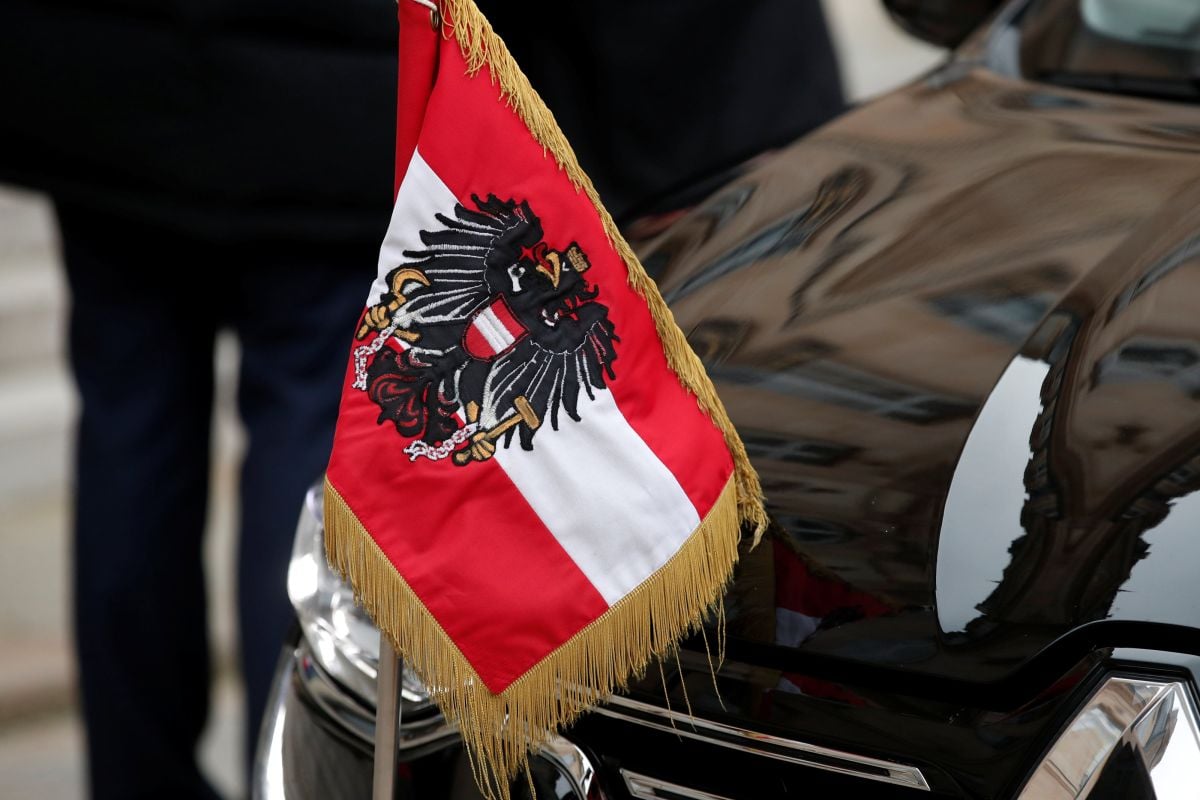
Spielfeld is a sleepy Austrian farming town at the border of Slovenia. In the winter of 2015, there were up to a thousand migrants and refugees arriving in the freezing cold every couple of days. Emotions were running high, like those of one elderly man, widely publicized, who didn't want the government to put a fence up through his vineyard.
Meanwhile, at an event that had been organized in Spielfeld by the far-right Freedom Party (FPÖ), and was filmed by one attendee for YouTube, a stocky man with what looked like a salon tan and a handkerchief in his blazer pocket had some intel to share with the locals about the real number of jihadists coming into Europe with these refugees. His "exclusive information" was, he suggested, from "the very top" of the Russian secret services, Josephine Huetline wrote in an article for The Daily Beast.
"Everyone can take a picture with me, I am here for you," FPÖ party leader Heinz-Christian Strache told the Spielfeld audience, which, as the Austrian newspaper Der Standard reported, included at least three men whom the secret service would soon register as dangerous right-wing extremists, before he went to have dinner in a pub that had a picture of Vladimir Putin hanging on the wall.
Cut to 2018, where Strache is Austria's vice-chancellor and his pro-Kremlin party controls the defense, interior, and foreign ministries under the conservative young chancellor, Sebastian Kurz. And while Strache has calmed his rhetoric, it looks like he and his team still seek out the company of other counter-liberal hotshots.
Read alsoDW: Thousands protest Austria's right-wing governmentThere is, for instance, the authoritarian Bosnian Serb leader who recently declared Strache a "wonderful friend" and awarded medals to both him and the Night Wolves, a Russian nationalist biker gang favored by Vladimir Putin. And then there's Strache's association with fellow Euroskeptics in the European Parliament faction headed by France's Marine Le Pen.
And if that gets dull, there is always Putin's ruling party, United Russia, with whom the FPÖ signed a highly publicized cooperation agreement just as the FPÖ was poised to win (then lost) the Austrian presidency in 2016.
According to a source cited by the German newspaper Frankfurter Allgemeine Zeitung, German Chancellor Angela Merkel already expressed concerns to Austrian Chancellor Kurz last week that the FPÖ will take the sensitive information that Western intelligence agencies share and leak it to Moscow.
Berlin denied these reports. But it's not the first time since last fall's elections that Vienna is hearing about these kinds of suspicions. And it's not just because of that two-page, mainly symbolic, document from 2016. In the hopes of such official recognition from Moscow, FPÖ leaders have been frantically networking with second-rank Kremlin politicians and celebrity fascist ideologues for the past decade.
So far, one Austrian intelligence officer has responded to the speculations. He told the Austrian newspaper Der Standard that foreign cooperation with the Austrian secret service, which has a record of blurting out secrets, is already at a minimum anyway. Foreign intelligence agencies, according to this officer, "think that we are unprofessional."
In the story of Austrian politics, Strache is neither a reliable narrator nor a particularly skilled liar. He's been nailed telling badly crafted fibs on live TV with the carelessness of someone who knows it doesn't matter if he's caught, like when he accused a photographer of "staging" the disconcerting picture of an asylum-seeking family at an FPÖ protest, and the photographer just called up the network and proved that he did no such thing.
So, back in Spielfeld, Strache also informed his audience that, actually, the USA (aka "the world's policeman") was behind the entire refugee crisis. He didn't go into detail or say where he'd gotten this piece of information. But it's worth noting that several months earlier, an article was published by the FPÖ-connected far-right magazine Info-Direkt, which alleged that the U.S. had paid smugglers to bring illegal migrants to Europe – this time with reference to "an anonymous source in the Austrian military intelligence."
Officials at the Austrian Defense Ministry rolled their eyes at this "scoop." But that didn't stop the "sensational information bomb" from making headlines on Russia's state radio service, Vesti FM. (And later on an extreme-right news website with links to France's National Front.)
Meanwhile, Info-Direkt is managed by a young Austrian ad-man who stuck a photograph of the Russian president on the magazine's first cover along with the headline "We want one like Putin." And like other Western far-right websites Info-Direkt uses Russian hosting services.
As things stand now, the Freedom Party, however loud it lobbies, won't be ending European sanctions against Russia. "They will not be able to challenge Austria's general line," according to Anton Shekhovtsov, an expert on European extremist groups and the author of Russia and the Western Far Right. To placate suspicions, the Freedom Party nominated Karin Kneissl, an independent Middle East expert, as foreign minister.
And Chancellor Kurz, in response to the Freedom Party's overall diplomatic posture, decided to shift some of the EU departments from the foreign ministry to his own office. The ambitious 31-year-old has also reassured other European leaders that his government will continue to follow a pro-EU line – though to what extent he can guarantee that and hold together his insecure far-right coalition remains to be seen.
Kurz also said that he wants Austria to be "a land of building bridges" between western and eastern Europe, a phrase that harks back to Vienna's Cold War role as a venue for U.S.-Soviet summits. But others are more skeptical.
"The bridge-building thing has always been historically overestimated," newspaper columnist Hans Rauscher tells The Daily Beast. "There is also some narcissism in this idea of ‘it particularly depends on us.'"
The risk, of course, is that while the Austrians think of building bridges, the Russians think of building bridgeheads.

